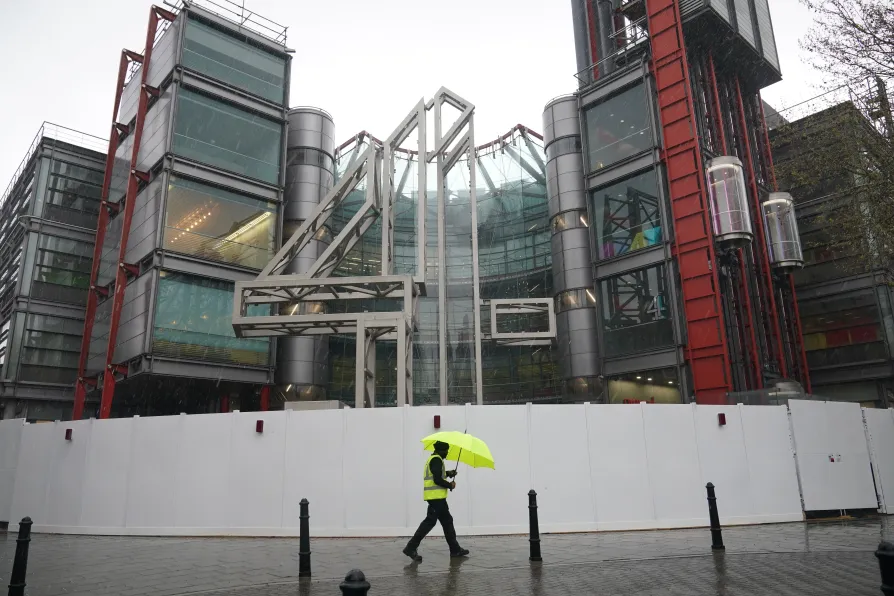John Wojcik pays tribute to a black US activist who spent six decades at the forefront of struggles for voting rights, economic justice and peace – reshaping US politics and inspiring movements worldwide
With the news of massive pay rises for senior management while content spend dives STEPHEN ARNELL wonders when will someone call out the greed of these ‘public service’ executives

 The Channel 4 logo outside offices in Horseferry Road, London
The Channel 4 logo outside offices in Horseferry Road, London
“CHANNEL 4 was created to be a disruptive, innovative force in British broadcasting. Publicly owned yet entirely commercially funded, Channel 4 generates significant and sustainable cultural, economic and social impact across Britain — at zero cost to the taxpayer.”
The recent news that senior staff at public service broadcaster C4 are trousering 32 per cent pay rises has gone down like the proverbial “cup of cold sick” to a large slice of the British TV industry.
That this happening at the same time as the network is slashing staff numbers, shrinking programme budgets (beggaring independent production companies) while offering a degraded slate of programming has left many wondering whatever happened to C4?
As ostensibly a public service broadcaster, viewers may be understandably irritated by the unjustifiably high salaries and bonuses raked in by executives, while the channel transmits such fare as Virgin Island, My Massive C*ck, back-to-back “Property Porn,” Boris Johnson’s appearance on election night, Katie Price’s Mucky Mansion, The British Tribe Next Door, and poached shows Bake Off and Taskmaster.
Return of the ‘bonkbuster’
Outgoing C4 CEO Alex Mahon’s earnings have soared by 44 per cent to £1.3 million, including a £544,000 bonus, more than double her previous variable pay in 2023. Despite still being in post, Mahon has taken time out of her busy schedule to co-author “bonkbuster” The Rich Bitch Club and hawk the synopsis to publishers and rival TV executives, presumably in the hope of achieving Rivals-style (Disney+) ratings and juice up prospective book sales, further swelling her already sizeable bank account.
Describing the tome, which her promoters have immodestly likened to Tom Wolfe’s classic Bonfire of the Vanities (1987), Mahon stated: “The world is at a tipping point. The glass ceiling has been cracked but not shattered. Women are seizing boardrooms, commanding industries, and rewriting the rules of power. Yet, their stories — the raw, ruthless and triumphant realities of rising to the top — remain largely untold.”
This zeal for the cause of women’s empowerment appears to clash with C4’s documented use of NDAs (“in all but name”) to silence staff, with sexual misconduct and pregnancy “discrimination” listed as major issues. All this from a broadcaster which proclaimed itself as a “sponsor and defender of free speech.”
The whiff of entitlement and hypocrisy is particularly heavy around Mahon, who departs C4 to run festival promotion mammoth Superstruct, where her salary will “almost certainly be significantly more lucrative than that currently paid by C4”, according to C21 magazine.
Incidentally, Superstruct is now owned by global investment firm KKR, which has generated controversy, as according to an open letter sent by 50 performers the company is, “known to invest in companies which develop Israeli underground data centres and advertise real estate on illegally occupied land in Israeli settlements in the West Bank.”
Did Mahon perform any due diligence? Or perhaps she doesn’t really give a monkey’s, as long as the dough is right, which could appear to be the motivating factor, beneath of course, the carefully cultivated veneer of progressivism.
With C4 now also becoming a programme-maker rather than as previously, a publisher-broadcaster, independent producers fear favouritism in the commissioning process (the new production entity will have direct access to the relevant C4 executives in the same building) and a further hollowing out of a once vibrant part of Britain’s broadcasting ecology.
‘Nice work if you can get it’
This has long been a problem, given the propensity of TV executives to commission shows from ex-colleagues. Case in point Mothership Productions, launched in 2022 by former deputy director of programs and head of popular factual Kelly Webb-Lamb, who left C4 in 2021 and since received at least two commissions from her former colleagues.
“Nice work if you can get it” as the song goes.
As said, many in Britain’s TV industry are understandably angry, but there is little evidence of this in the trade press, who have tended, because of the channel’s once merited reputation, to grant C4 a degree of critical indulgence that the broadcaster hasn’t actually earned for quite some considerable time. PACT (the British trade body for independent production and distribution companies) CEO John McVay stated: “Having fought very hard against the privatisation of Channel 4, this is a bitter pill to swallow for the indie sector.”
One cannot legislate against hypocrisy and greed, but surely there can be rules set in place regulating pay for those TV executives who elect to join a public service broadcaster such as C4? Presumably, their talents are such that non-public service networks would snap them up, thereby absolving these high-flyers of any ethical concerns. If they ever had them, which in most cases, is doubtful.

STEPHEN ARNELL wonders at the family resemblance between former prince Andrew and his great-uncle ‘Dickie’

While Spode quit politics after inheriting an earldom, Farage combines MP duties with selling columns, gin, and even video messages — proving reality produces more shameless characters than PG Wodehouse imagined, writes STEPHEN ARNELL

The fallout from the Kneecap and Bob Vylan performances at Glastonbury raises questions about the suitability of senior BBC management for their roles, says STEPHEN ARNELL

DENNIS BROE sifts out the ideological bias of the newest TV series offerings, and picks out what to see, and what to avoid









